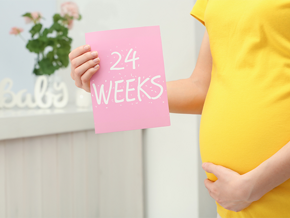
Tossing and turning again at 2 a.m.? You’re not alone. In fact, a 2024 meta-analysis in Frontiers in Psychiatry found that insomnia during pregnancy is a global issue, affecting nearly 44% of expectant mothers.
This guide breaks down the common causes and shares practical tips to help you get the rest you need, featuring expert advice from Dexter Ian L. Mallari, MD FPOGS (Fellow, Philippine Obstetrical & Gynecological Society).
Causes of Insomnia in Pregnancy
According to Dr. Mallari, "pregnant women may encounter difficulty in sleeping basically during the entire duration of their pregnancy journey."
The causes of insomnia often change as you go through your trimesters, from early hormonal changes to physical discomfort. Here are some of the most common triggers.
Shifting hormones
As Dr. Mallari explains, changing hormone levels are a primary reason you might experience insomnia in early pregnancy. "Difficulty in sleeping may be attributed to experiencing symptoms such as nausea and vomiting."
Frequent trips to the bathroom
By the second trimester, sleep may improve slightly. However, as your uterus grows, it puts more pressure on your bladder, adds Dr. Mallari. At the same time, your body’s blood volume increases, making your kidneys work overtime.
The result? You wake up multiple times a night to pee as your pregnancy progresses, making it hard to fall back into a deep sleep.
Physical aches and pains
As your baby grows bigger, the extra weight you’re carrying can lead to back pain, hip discomfort, and leg cramps. Finding a comfortable position becomes a real challenge, especially during the third trimester.
Anxiety and racing thoughts
It's typical for anxious thoughts about your baby's health and becoming a parent to keep your mind buzzing at night. Those restless nights can take a toll on your emotional well-being.
A 2025 study in BMC Pregnancy and Childbirth shows that insomnia and depression often walk hand-in-hand throughout pregnancy and even into the postpartum period.
Heartburn and indigestion
Pregnancy hormones can slow down your digestive system and relax the valve between your stomach and esophagus, allowing stomach acid to creep up and cause uncomfortable heartburn. It often feels worse when you're lying down.
Your baby’s nightly routine
Another cause of insomnia during late pregnancy is your active baby. You may feel their kicks, squirms, and hiccups more distinctly. Sometimes, their most active period is bedtime!
Difficulty breathing
Your expanding uterus can put pressure on your diaphragm, making you feel short of breath even when lying down. Some pregnant women also experience nasal congestion due to hormonal changes, which can contribute to snoring and breathing difficulties.
Restless legs syndrome (RLS)
If you have an overwhelming urge to move your legs, especially in the evening when you're trying to relax, you might have restless legs syndrome. This condition was a common cause of sleep disruption, according to a 2024 study in Sleep Medicine, affecting up to 25% of the participants and peaking during the third trimester.
7 Tips to Help Manage Insomnia During Pregnancy

Take time to wind down before bed with a good book to signal to your body that it’s time to rest.
Building healthy sleep habits is your best strategy for improving your rest. Here are some helpful tips to get you started.
1. Create a consistent sleep routine.
"Have a routine sleeping schedule," advises Dr. Mallari. Try to go to bed and wake up around the same time every day, even on weekends. This routine helps regulate your sleep-wake cycle, making it easier to fall asleep and stay asleep.
2. Take time to wind down before bed.
Relax before bed by turning off screens, as blue light can disrupt the production of sleep hormones. Instead, try taking a warm bath, reading a book, or listening to a guided meditation app to help quiet your mind and lower your stress levels.
"Keeping your bedroom clean, with a nice ambience can also help induce a good night's sleep. If you're not sensitive or allergic, essential oils have been studied to bring calmness and relaxation. Light calming music can be beneficial as well, even for the fetus," notes Dr. Mallari.
3. Find a comfortable position.
Your sleep position plays a huge role in getting comfortable. Experts often recommend sleeping on your left side to improve blood flow.
"Body pillows can also help for a more comfortable sleeping position, especially when sleeping on your side," explains Dr. Mallari. Elevate your head to help with heartburn. And keep your room cool, dark, and quiet to minimize disruptions.
4. Engage in gentle exercise.
According to Dr. Mallari, light exercise such as yoga and meditation can help reduce stress and calm you, helping you to achieve better sleep. Just be sure to avoid vigorous activity in the few hours before bedtime so your body has time to cool down.
According to the American College of Obstetricians and Gynecologists, physical activity is generally considered safe for low-risk and healthy pregnancies. But always consult with your doctor before starting a workout routine.
5. Keep daytime naps short and sweet.
"If you lack of sleep at night, napping during the day can also help, to make up for needed rest," says Dr. Mallari. But try to keep it to 30 minutes or less and avoid napping late in the afternoon.
A short power nap can be refreshing, while a long one can interfere with your ability to fall asleep at night.
6. Be mindful of what you eat and drink.
Dr. Mallari also suggests eating healthy and eating on time. "[Try to] avoid or limit caffeine-containing drinks, as well as eating food that takes longer and are harder to digest."
If you’re hungry, opt for a light snack like a banana, a small bowl of oatmeal, or a glass of warm milk.
"Eating lighter meals and limiting fluid intake at night helps so as not to trigger symptoms like hyperacidity and acid reflux as these may affect your sleep," he adds. "Drinking warm milk can also be helpful as it helps promote sleep-inducing hormones."
7. Address your worries.
Don’t let your anxieties build up! "Your partner or companion can be your support system, who can assist you in case you encounter these situations," suggests Dr. Mallari.
A 2025 study in Nature and Science of Sleep found that strong family support acts as a protective shield, significantly weakening the impact of stress on your sleep.
When to Talk to Your Doctor

Talk to your doctor about insomnia during pregnancy to find safe solutions for more restful nights.
Dr. Mallari advises consulting your obstetrician if insomnia greatly affects your daily activities and nutrition.
He adds, "You can be assessed, treated or referred accordingly. For the fetal aspects, we should watch out signs such as growth restriction, or decrease in fetal movements, as these may reflect the well-being of the baby."
Reach out to your healthcare provider if:
- Your sleeplessness lasts for more than a couple of weeks.
- Your lack of sleep is making it hard to get through your day.
- Feelings of severe anxiety or depression accompany your insomnia.
- You're considering any over-the-counter sleep aids, supplements, or herbal remedies. Your doctor can ensure they're safe for your pregnancy.
A 2021 study in BMC Pregnancy and Childbirth found that insomnia is so common in the third trimester, it should be a routine part of prenatal check-ups. So, bring up any sleep concerns with your doctor—it's a key part of your care.
FAQs About Insomnia During Pregnancy
Can lack of sleep harm the baby?
Occasional sleepless nights are unlikely to harm your baby. However, chronic sleep deprivation can affect your mood and overall health. The same 2024 study in Frontiers in Psychiatry has linked persistent insomnia to a higher risk of serious conditions like preeclampsia, gestational diabetes, and premature delivery.
Are sleep medications safe during pregnancy?
You should never take any sleep medication (prescription, over the counter, or herbal) without talking to your doctor first. Many sleep aids aren't considered safe during pregnancy, but your provider can guide you toward safe options if needed.
Will my insomnia go away after I give birth?
For many women, sleep does get better after birth since the pregnancy discomforts fade. However, new challenges, such as your baby's feeding schedule and your own recovery, will bring new disruptions, so continue with the good sleep habits you've established.
You can improve your chances of getting a good night's sleep when you apply the tips above and understand the causes of insomnia during pregnancy. Be patient with yourself and your changing body!
Connect with other parents on the ParentTeam Moms and Dads Facebook group and share your own tips for managing insomnia during pregnancy!
References
D. Mallari, MD, FPOGS, personal communication, October, 7, 2025.
American Pregnancy Association. "Pregnancy Insomnia: Snooze Or Lose!" Last updated May 12, 2021. Accessed September 25, 2025. https://americanpregnancy.org/healthy-pregnancy/pregnancy-health-wellness/insomnia-during-pregnancy/.
Aukia, Linda, E. Juulia Paavonen, Tuire Jänkälä, Mimmi Tolvanen, Riikka Korja, Linnea Karlsson, Hasse Karlsson, and Päivi Polo-Kantola. "Insomnia symptoms increase during pregnancy, but no increase in sleepiness - Associations with symptoms of depression and anxiety." Sleep Medicine 72 (2020): 150–56. https://doi.org/10.1016/j.sleep.2020.03.031.
Cleveland Clinic. "Pregnancy Insomnia." Last reviewed January 3, 2024. Accessed September 25, 2025. https://my.clevelandclinic.org/health/diseases/pregnancy-insomnia.
Cleveland Clinic. "Pregnancy Rhinitis." Last reviewed February 28, 2022. Accessed September 25, 2025. https://my.clevelandclinic.org/health/diseases/pregnancy-rhinitis.
Hashmi, A. M., S. K. Bhatia, S. K. Bhatia, and I. S. Khawaja. "Insomnia during Pregnancy: Diagnosis and Rational Interventions." Pakistan Journal of Medical Sciences 32, no. 4 (2016): 1030–37. https://doi.org/10.12669/pjms.324.10421.
Johns Hopkins Medicine. "Get a Good Night's Sleep During Pregnancy." n.d. Accessed September 25, 2025. https://www.hopkinsmedicine.org/health/conditions-and-diseases/staying-healthy-during-pregnancy/get-a-good-nights-sleep-during-pregnancy.
National Health Service (NHS). "Tiredness and sleep problems in pregnancy." Last reviewed March 11, 2024. Accessed September 25, 2025. https://www.nhs.uk/pregnancy/related-conditions/common-symptoms/tiredness/.
OBGYN Care Marinescu. "Is This Normal During Pregnancy? Your Top 7 Concerns Answered." March 17, 2023. Accessed September 25, 2025. https://www.obgyn-care.net/blog/is-this-normal-during-pregnancy-your-top-7-concerns-answered.
Pacheco, Danielle. "Sleeping While Pregnant: Third Trimester." Sleep Foundation. Updated July 16, 2025. Accessed September 25, 2025. https://www.sleepfoundation.org/pregnancy/sleeping-during-3rd-trimester.
Summer, Jay Vera. "How to Sleep Better While Pregnant." Sleep Foundation. Updated July 16, 2025. Accessed September 25, 2025. https://www.sleepfoundation.org/pregnancy/tips-for-better-sleep.




























